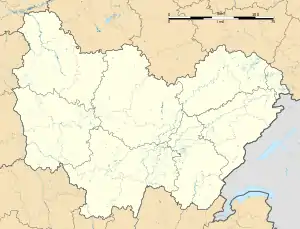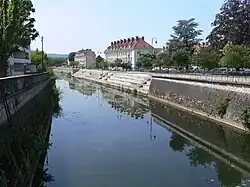Vesoul | |
|---|---|
Prefecture and commune | |
        | |
 Coat of arms | |
Location of Vesoul | |
 Vesoul  Vesoul | |
| Coordinates: 47°37′23″N 6°09′21″E / 47.6231°N 06.1558°E | |
| Country | France |
| Region | Bourgogne-Franche-Comté |
| Department | Haute-Saône |
| Arrondissement | Vesoul |
| Canton | Vesoul-1 and 2 |
| Intercommunality | CA Vesoul |
| Government | |
| • Mayor (2020–2026) | Alain Chrétien[1] |
| Area 1 | 9.07 km2 (3.50 sq mi) |
| Population | 15,130 |
| • Density | 1,700/km2 (4,300/sq mi) |
| Time zone | UTC+01:00 (CET) |
| • Summer (DST) | UTC+02:00 (CEST) |
| INSEE/Postal code | 70550 /70000 |
| Elevation | 213–375 m (699–1,230 ft) (avg. 220 m or 720 ft) |
| 1 French Land Register data, which excludes lakes, ponds, glaciers > 1 km2 (0.386 sq mi or 247 acres) and river estuaries. | |
Vesoul (French pronunciation: [vəzul] ⓘ) is a commune in the Haute-Saône department in the region of Bourgogne-Franche-Comté located in eastern France.
It is the most populated municipality of the department with 15,212 inhabitants in 2014. The same year, the Communauté d'agglomération de Vesoul which covers 20 municipalities together had 34,310 inhabitants while the Urban area of Vesoul which includes 78 municipalities, had 59,244 inhabitants. Its inhabitants are known in French as Vésuliens.
Built on top of the hill of La Motte in the first millennium under the name of Castrum Vesulium, the city gradually evolved into a European commercial and economic center. At the end of the Middle Ages, the city experienced a challenging period beset with plagues, epidemics, and localized conflict.
Main urban center of the department, Vesoul is also home to a major PSA parts manufacturing plant and to the Vesoul International Film Festival of Asian Cinema. It was immortalized by Jacques Brel in his 1968 song "Vesoul".
The town is the capital of the department of Haute-Saône.
History
Vesoul is first mentioned in a document dated 899. That document speaks about an elevation with a fortified watchtower. The document speaks about "Castrum Vesulium". Castrum is a fortification, and "Vesulium" has the syllable ves which meant hill or mountain in a language that was spoken before the Celts. Today, there is a castle that forms the centre of the city. The first houses were built inside the walls of the castle. Newcomers who found no place settled outside the city walls, on the flanks of the hill. Growing wine was popular.
The town was severely affected by the plague in 1586. It became part of France in 1678.[3]
In 1814, after the fall of the empire, a buffer state was created, with Vesoul as capital. The principality was that of Free County, of the Vosges and of Porrentruy.
Today, one of the main factories of PSA Peugeot Citroën is near Vesoul.
Geography

Vesoul is located in the eastern part of France, about 100 kilometers away from the Germany and the Switzerland border and between the Jura and the Vosges's mountain ranges. Vesoul is also situated in the center of the Haute-Saône, which is in the nord of Bourgogne-Franche-Comté. Inside of this region, Vesoul is included in the Pays de Vesoul et du Val de Saône, a geographical region composing of the Vesoul's area and the northern part of the river Saône.
By the road, Vesoul is 32 kilometres (20 mi) from Luxeuil-les-Bains, 30 kilometres (19 mi) from Lure and 59 kilometres (37 mi) from Gray, that are the main towns close to Vesoul. About the biggest cities in the French East region, Vesoul is located 50 kilometres (31 mi) from Besançon, 64 kilometres (40 mi) from Belfort and 105 kilometres (65 mi) from Dijon and 156 kilometres (97 mi) from Nancy.[4] Situated at the equidistance of Dijon and Mulhouse, Vesoul is 370 kilometres (230 mi) from the city of Paris.[5] The town of Vesoul is located at the intersection of national roads N19 and N57. Vesoul station is on the SNCF Paris–Mulhouse railway line, and has connections with Paris, Belfort, Mulhouse and Chaumont.
The area of Vesoul is also included in the Pôle métropolitain Centre Franche-Comté which is a government structure unifying the biggest areas of central Franche-Comté. There are nine communes that are bordering the town of Vesoul.
Vesoul is crossed by four watercourses : two rivers (Durgeon and Colombine) and two streams (Vaugine and Méline). All of them are tributaries and sub-tributaries of the Saône, the fourth longest river in France with 473 kilometers long[6] and flowing about ten kilometers from the western side of Vesoul.[7]
Governance and politics
Mayors
Twin towns
 Gerlingen, Germany, since 1964
Gerlingen, Germany, since 1964
Administrative division
Population and society
- Jean-Michel Nicolier ( 1 July 1966 – 20/21 November 1991), French volunteer in the Croatian War of Independence who was killed in the Vukovar massacre
- Sophie Bouillon (born 1984), independent journalist, winner of the 2009 Albert Londres Prize.
Demography
|
|
| |||||||||||||||||||||||||||||||||||||||||||||||||||||||||||||||||||||||||||||||||||||||||||||||||||||||||||||||||||||
| Source: Ehess[8] and INSEE[9] | |||||||||||||||||||||||||||||||||||||||||||||||||||||||||||||||||||||||||||||||||||||||||||||||||||||||||||||||||||||||
Media
Vesoul is also the name of a song by Jacques Brel from 1968, a fast-paced waltz during the recording of which Brel famously yelled "Chauffe, Marcel, chauffe!" ("heat up, Marcel, heat up!") at his accordionist, Marcel Azzola.
The town is also mentioned facetiously in the satirical rap Fous ta cagoule by Michael Youn.[10]
Sport
- FC Vesoul, football club
- Stade René Hologne
- Cercle de Judo de Vesoul, Judo club with a competitors section
Education
Vesoul has schools of higher education. The city has 1,200 students divided between an IUT, an IUFM, an Institute of Nursing Training, a School of Management and Commerce and BTS.
A Council of Student Life (CVE), led by the Officer in charge of Higher Education, was established in 2011. It offers activities to stimulate student life. In all, Vesoul has 10,000 students.
All schools and studies in Vesoul
|
Kindergarten
|
Primary School
|
Public College
Private College
|
General and Technical High School
Vocational College
Apprentice Training Centre
|
Studies senior
|
Culture and heritage




Monuments and tourist attractions

- Vieux Vesoul (Old Vesoul) (buildings from the 15th, 16th and 18th centuries and Garret Museum)
- Site of Vesoul's Motte
- Site of the Sabot de Frotey
- Lake of Vesoul - Vaivre
- Vesoul-Vaivre Vélo-rail
- Convent of the Ursulines (17th century)
- St. George's Church, Vesoul
- Gare de Vesoul
- PSA Vesoul Plant
- Synagogue of Vesoul
- Musée Georges-Garret
- Notre-Dame-de-la-Motte
- Paul Morel Hospital
- Lac de Vesoul - Vaivre

Festival
Library
The first public library of Vesoul opened in 1771. The abbé (abbot) Bardenet, superior of the Saint-Esprit hospital in Besançon, gave his book collection to the town. There were 1772 books. The collections became a lot larger with the Revolution. At that time, the revolutionaries (people who led the French Revolution) took the books from the monasteries of the town (capucins) and even of the region (Luxeuil and Faverney monasteries). Around 20,000 books were added to the library this way, including some 11th century manuscripts. The Mayor's office was responsible for keeping the books.
In 1981, the municipality decided to build a new building to encourage the public to read. The library was recently equipped with computers. There are around 200 manuscripts and 150 incunables.
Areas


|
Neighborhoods
|
Sectors :
|
Commercial areas :
|
Industrial areas :
|
Spaces :
|
Notable people
- Jean-Léon Gérôme
- Raymond Aubrac
- Édouard Belin
- Edwige Feuillère
- Charles Grandmougin
- Arthur Constantin Krebs
- Laurent Mangel
- Jean Pierre Marie Orchampt
- Robert Schurrer
- Stéphane Peterhansel
- Albert Cartier
- Abel Khaled
- Jean-Baptiste Humbert
- Alain Joyandet
- Yves Krattinger
- Mickaël Ravaux
- Jean-Xavier Bureau de Pusy
- Georges Cogniot
- Théodule-Armand Ribot
- Albert Mathiez
- Jean Peyrière
- Julien Casoli
- Amédée Simon Dominique Thierry
- Affo Erassa
- Jean Compagnon
- Cédric Si Mohamed
- Katty Piejos
- Vincent Luis
- Frédéric Vichot
- Pascal Dagnan-Bouveret
- Jean-Michel Nicollier
- Pape Mamadou Diouf
- Roger Munier
- Jean-Joseph Gaume
Awards
- Vesoul inaugurated the first Cyber Base France in 1999
- Voted "most athletic city of France" in 2001
- Labeled "Child Friendly City" by UNICEF in 2006. This label was renewed in 2009.
- Labeled "friendly and inclusive City" in 2010
- Labeled "Cities and villages in bloom" and has 3 flowers
- Labeled "QualiTri Collection" in 2012
- Vesoul is the second city in France to obtain ISO 14001 certification
See also
References
- ↑ "Répertoire national des élus: les maires" (in French). data.gouv.fr, Plateforme ouverte des données publiques françaises. 13 September 2022.
- ↑ "Populations légales 2021". The National Institute of Statistics and Economic Studies. 28 December 2023.
- ↑ Columbia Encyclopedia 6th Edition (2000), Columbia University Press, p.2983.
- ↑ "Inspire toi". Archived from the original on 22 February 2014.
- ↑ Distance entre Vesoul et les plus grandes villes, annuaire-mairie.fr
- ↑ "Fiche de la Saône". le site du SANDRE. Retrieved 5 May 2014..
- ↑ "Vesoul - Universalis". le site de l'encyclopédie Universalis. Retrieved 3 June 2020..
- ↑ Des villages de Cassini aux communes d'aujourd'hui: Commune data sheet Vesoul, EHESS (in French).
- ↑ Population en historique depuis 1968, INSEE
- ↑ "Fous ta Cagoule" by Fatal Bazooka--English Translation
External links
- Official website (in French)
- Proxoo.com – Site about the city center (in French)